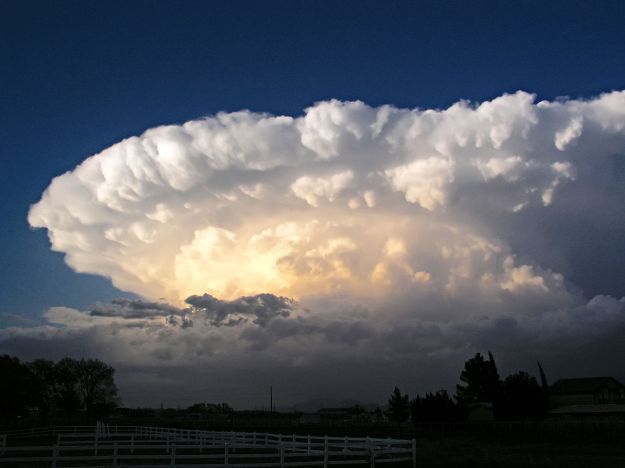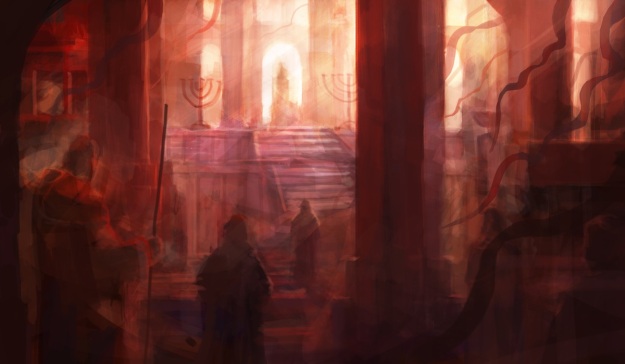
Torah inside of the former Glockengasse Synagogue in Cologne. Photo shared under Creative Commons Attribution- Share Alike 4.0, source Zeughaus
Exodus 23:1-9 And Justice for All
You shall not spread a false report. You shall not join hands with the wicked to act as a malicious witness. 2 You shall not follow a majority in wrongdoing; when you bear witness in a lawsuit, you shall not side with the majority so as to pervert justice; 3 nor shall you be partial to the poor in a lawsuit.
4 When you come upon your enemy’s ox or donkey going astray, you shall bring it back.
5 When you see the donkey of one who hates you lying under its burden and you would hold back from setting it free, you must help to set it free.1
6 You shall not pervert the justice due to your poor in their lawsuits. 7 Keep far from a false charge, and do not kill the innocent and those in the right, for I will not acquit the guilty. 8 You shall take no bribe, for a bribe blinds the officials, and subverts the cause of those who are in the right.
9 You shall not oppress a resident alien; you know the heart of an alien, for you were aliens in the land of Egypt.
The end of the Pledge of Allegiance for the United States ends with the phrase, “with liberty and justice for all.” Yet, liberty and justice for all people has been a challenging part of the United States’ story as it attempts to live into these words. Who does the ‘all’ encompass? In the United States that definition was initially white landholding males. The Civil War and the long struggle for Civil Rights attempted to expand the all to include people of color. Women’s movements have attempted to increase the equity in the world and the workplace for women. Probably the place where this generates the largest amount of friction in our current civil discourse relates to men and women who are LGBTQ in their identity. Without justice, the alternative society the people of Israel were tasked to create would devolve into a mirror of the Egyptian society they left.
Initially the ‘all’ in Exodus 23 extends to all citizens, both the rich and the poor. Truthful speech on behalf of the neighbor was essential. Not only does the command to not bear false witness get included in Exodus 20:16 but here it is amplified. They are to be people of truthful speech on behalf of their neighbor, they are not to be deceitful for their own gain of to remain in good standing with the majority. They are to be willing to speak inconvenient truths rather than to pervert justice. The prophets will be examples of those who are charged to speak in ways that rely upon God’s witness and the truth to both leaders and people who may not want to hear. Judgment is not to favor the rich and the powerful but it is also not to be swayed by a bias towards the poor (or against the rich).
Secondly the ‘all’ extends to the enemy and their property, particularly here the animals. Exodus is realistic enough to understand that all relationships within a society will not be friendly. Yet, my enemy’s animal being loose or overburdened becomes my responsibility. Even though the loss of an animal would hurt the one who hates me, for both my enemy and the animal I bear responsibility to set it free from its burden or to bring it back to my enemy. Ultimately my enemy is my neighbor and the law protects my enemy and their property.
The ‘all’ includes my neighbor, rich or poor, and neither are to be denied justice. Justice requires the people in authority not to take bribes, for people not to bring false charges to steal a neighbor’s property, life or reputation, or any other practice that subverts justice. Finally, the ‘all’ extends to the stranger, or the resident alien as the NRSV translates it. As in the previous chapter, these strangers who are not a part of the people of Israel are not to be oppressed. The experience of the people of Israel being oppressed as ‘strangers’ or ‘resident aliens’ in Egypt is to form a contrast to the society they are to create. Within the immigration debate in the United States is another realm where our nation struggles with the ‘all’ of the pledge. Within the Torah the inclusion of the ‘resident alien’ into the ‘all’ is stated frequently as a reminder to the people of Israel, and those who would claim their scriptures as a part of their own scriptures, that they are to be a people where the ‘all’ is very expansive.
Exodus 23: 10-13 Creation’s Sabbath Rest
10 For six years you shall sow your land and gather in its yield; 11 but the seventh year you shall let it rest and lie fallow, so that the poor of your people may eat; and what they leave the wild animals may eat. You shall do the same with your vineyard, and with your olive orchard.
12 Six days you shall do your work, but on the seventh day you shall rest, so that your ox and your donkey may have relief, and your homeborn slave and the resident alien may be refreshed. 13 Be attentive to all that I have said to you. Do not invoke the names of other gods; do not let them be heard on your lips.
The practice of a fallow year for the fields may have had a positive impact on the fertility of the ground but here the justification goes back to the care of the neighbor. The year where the field lies fallow and vineyards and olive orchards grow without the tending allow for the poor and the wild animals to benefit. Much as the gleaning provisions in Leviticus 19: 9-10, 23:22 and Deuteronomy 24: 21 provide a way for the vulnerable of the land to be cared for, here this seventh-year practice is another way in which the community is to provide an opportunity for survival of the at-risk neighbor.
The Sabbath commandment is re-visited here as well along with the reminder that the Sabbath is rest not only for the people of Israel but for all in their borders to rest. Animals, slaves and resident aliens are beneficiaries along with the people of Israel in this commandment to rest. Here in Exodus there is a creation pattern which the Sabbath is modeled after: In six days the earth was created (according to Genesis 1) and on the seventh day the LORD rested. Now this seventh day which the LORD hallowed becomes the model for the seventh year where the fields lie fallow and the seventh day where people and animals of creation rest.

Painted Sukkah with a view of Jerusalem, Late 19th Century, Austria or South Germany
Exodus 23: 14-19 Festival and Sacrifice
14 Three times in the year you shall hold a festival for me. 15 You shall observe the festival of unleavened bread; as I commanded you, you shall eat unleavened bread for seven days at the appointed time in the month of Abib, for in it you came out of Egypt.
No one shall appear before me empty-handed.
16 You shall observe the festival of harvest, of the first fruits of your labor, of what you sow in the field. You shall observe the festival of ingathering at the end of the year, when you gather in from the field the fruit of your labor. 17 Three times in the year all your males shall appear before the Lord GOD.
18 You shall not offer the blood of my sacrifice with anything leavened, or let the fat of my festival remain until the morning.
19 The choicest of the first fruits of your ground you shall bring into the house of the LORD your God. You shall not boil a kid in its mother’s milk.
The calendar of festivals for the people of Israel is centered around the Exodus narrative and the yearly cycle of harvest. Exodus 12 and 13 narrate the celebration of Passover as a part of the narrative of the people leaving Egypt. This was to be the defining narrative of the people and the community in their gathering, sacrifice and ritualized eating would tell again the narrative of what made this celebration unique and how these actions defined their life as the people of God.
Deuteronomy 16 also narrates the festivals of first fruits and the festival at the end of the harvest. These were to be the times when the males of Israel would appear before the LORD. In a time where people would have to travel to the place where the LORD placed his name (either the tabernacle, shrines or later the temple) there was not the ability for most people to worship weekly like many people are familiar with. These festivals became communal gathering times and times of celebration for the harvest that was a part of the year.
The people were to bring their best to the LORD at these celebrations and times of sacrifice. There were practices they were not to do: like boiling a kid in its mother’s milk or offering anything leavened with the blood of the sacrifice, but most of these offerings were used as a part of the community’s celebration. They were times of feasting and celebration, storytelling and gathering.
Exodus 23: 20-33 Promised Presence in Future Conflicts
20 I am going to send an angel in front of you, to guard you on the way and to bring you to the place that I have prepared. 21 Be attentive to him and listen to his voice; do not rebel against him, for he will not pardon your transgression; for my name is in him.
22 But if you listen attentively to his voice and do all that I say, then I will be an enemy to your enemies and a foe to your foes.
23 When my angel goes in front of you, and brings you to the Amorites, the Hittites, the Perizzites, the Canaanites, the Hivites, and the Jebusites, and I blot them out, 24 you shall not bow down to their gods, or worship them, or follow their practices, but you shall utterly demolish them and break their pillars in pieces. 25 You shall worship the LORD your God, and I1 will bless your bread and your water; and I will take sickness away from among you. 26 No one shall miscarry or be barren in your land; I will fulfill the number of your days. 27 I will send my terror in front of you, and will throw into confusion all the people against whom you shall come, and I will make all your enemies turn their backs to you. 28 And I will send the pestilence1 in front of you, which shall drive out the Hivites, the Canaanites, and the Hittites from before you. 29 I will not drive them out from before you in one year, or the land would become desolate and the wild animals would multiply against you. 30 Little by little I will drive them out from before you, until you have increased and possess the land. 31 I will set your borders from the Red Sea1 to the sea of the Philistines, and from the wilderness to the Euphrates; for I will hand over to you the inhabitants of the land, and you shall drive them out before you. 32 You shall make no covenant with them and their gods. 33 They shall not live in your land, or they will make you sin against me; for if you worship their gods, it will surely be a snare to you.
The God of the Exodus has brought the people out of the land of Egypt and is bringing them on a journey to a new, promised land. The angel of the LORD who goes with the people becomes an intermediary of God’s promised presence and a guarantee of the LORD’s provision of security. There is both promise and threat here, much as Deuteronomy’s blessings and curses in Deuteronomy 28 and 29. If the people will listen to the voice of God, mediated through the angel (in addition to Moses) then God will be with them. However, if they do not there are consequences-this representative of God is not a forgiving presence. As people who have grown up with different sensibilities than the ancient Hebrew people there may be a tension between this demanding voice of God and many passages where God is portrayed as more gracious. Yet, obedience is one of the covenant expectations for the people.
The promise of God’s presence in the conquest of the promised land as it occurs in Deuteronomy 2, 3 and the book of Joshua presents many ethical challenges which I have addressed other places (see additionally Exodus 15, Deuteronomy 20, Psalm 18 and Violence and the Bible). There is an unavoidable tension between the concern for the resident alien and the command to utterly demolish the people of the land. Especially in the United States where there is a ‘new Exodus’ narrative (the United States becoming for many early Americans a new promised land and what that meant for the native Americans who were driven from their homes). There are no easy answers, every people has times where religion has been used to justify acts of violence. Every nation has parts of their history that have been glossed over. One of the struggles and gifts of going back to parts of the Bible that are rarely used is the opportunity to wrestle with the uncomfortable parts of the tradition and see what parts of the narrative we can lift up and what parts we need to acknowledge and ask forgiveness for.
Without dwelling on this in the same way I have in the other places listed above, the positive force in this is the command to trust in the promised presence of God in the people’s future conflicts. Ultimately, this formerly enslaved people have been promised God’s intervention as they make their way beyond the wilderness into their promised land. For the people, the promise of God’s presence makes the difference between their weakness on their own and their ability to conquer their foes through God’s strength.













